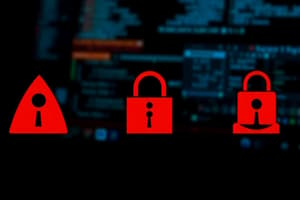Podcast
Questions and Answers
What is one consequence of implementing overly liberal ICT policies?
What is one consequence of implementing overly liberal ICT policies?
- Increased vulnerability to abuse and attack (correct)
- Better collaboration among users
- Enhanced user privacy and security
- Increased network speed and efficiency
Which of the following best defines a hacker?
Which of the following best defines a hacker?
- A person who tricks others to make money
- An individual who sends irrelevant messages online
- Someone who illegally copies software
- A person who gains unauthorized access to data (correct)
What is one recommended preventive measure to enhance network security?
What is one recommended preventive measure to enhance network security?
- Using high-capacity hard drives
- Installing antivirus software (correct)
- Using open networks for data sharing
- Regularly updating network policies
What is the primary concern of intellectual property rights?
What is the primary concern of intellectual property rights?
Which of the following is NOT considered a preventive measure against online threats?
Which of the following is NOT considered a preventive measure against online threats?
What is the primary function of malware?
What is the primary function of malware?
Which type of malware can replicate itself and requires human action to spread?
Which type of malware can replicate itself and requires human action to spread?
Which of the following does NOT represent a source of security breaches?
Which of the following does NOT represent a source of security breaches?
What characteristic distinguishes a Trojan horse from a virus?
What characteristic distinguishes a Trojan horse from a virus?
What is the main role of a firewall in network security?
What is the main role of a firewall in network security?
Which type of malware secretly gathers data and forwards it to a third party?
Which type of malware secretly gathers data and forwards it to a third party?
Which of the following statements is true regarding worms?
Which of the following statements is true regarding worms?
Which of the following best describes the purpose of implementing ICT policies?
Which of the following best describes the purpose of implementing ICT policies?
Flashcards
Malware
Malware
Malicious software designed to access or damage a computer without the owner's knowledge.
Computer Virus
Computer Virus
A self-replicating program that spreads from one computer to another by attaching itself to a program or file.
Computer Worm
Computer Worm
A self-replicating program that spreads from computer to computer automatically.
Trojan Horse
Trojan Horse
Signup and view all the flashcards
Spyware
Spyware
Signup and view all the flashcards
Security Breach Source: Poor Network Implementation
Security Breach Source: Poor Network Implementation
Signup and view all the flashcards
Security Breach Source: Lack of ICT Policies
Security Breach Source: Lack of ICT Policies
Signup and view all the flashcards
Security Breach Source: Carelessness
Security Breach Source: Carelessness
Signup and view all the flashcards
ICT policy vulnerabilities
ICT policy vulnerabilities
Signup and view all the flashcards
Unauthorized data access
Unauthorized data access
Signup and view all the flashcards
Software piracy
Software piracy
Signup and view all the flashcards
Firewall function
Firewall function
Signup and view all the flashcards
Intellectual property
Intellectual property
Signup and view all the flashcards
Study Notes
Security and Ethics
- Computer and data security is the practice of protecting computer and data from unauthorized access and corruption.
- Sources of security breaches:
- Malware (viruses, worms, spyware, Trojan horses)
- Poor network implementation
- Lack of ICT policies
- Carelessness
- Hackers, spammers, scammers
- Malware: malicious programs designed to access or damage a computer without the owner's knowledge.
- Viruses: Attach to programs/files, spreading infections as they travel. Need human action (e.g., running an infected program) to spread.
- Worms: Spread from computer to computer without human intervention, taking advantage of file transport features.
- Trojan horses: Not viruses. Disguised as legitimate applications, but can be destructive. Open backdoors for malicious access.
- Spyware: Malicious software that gathers data about a user and sends it to a third party without consent. Sometimes used legitimately for advertising.
- Poor network implementation: Security vulnerabilities in network setups.
- Poor/lack of ICT policies: Lax or absent network access policies make systems vulnerable.
- Carelessness: Providing personal information without proper security measures.
- Hackers, spammers, scammers: Individuals who use computers to gain unauthorized access, send unwanted messages, or defraud others
Ethics
- Ethics are moral principles guiding individual and group behavior.
- Computer ethics are moral principles governing computer use.
Legal Issues
- Legal issues related to ICT use and misuse:
- Intellectual property rights: Exclusive rights to creations of the mind (e.g., plans, ideas, intangible assets), for a specific time.
- Piracy: Illegal copying, distribution, or use of software.
- Effect of computers on society: Job losses, social impacts, etc.
Preventive Measures
- Antivirus software: (e.g., Norton, McAfee, Avast)
- Firewalls: Software/hardware that filters data entering/leaving a network or computer.
- Careful handling of information: Don't share sensitive data carelessly.
- Proper network implementation and policies: Secure network setups.
- Caution opening email attachments: Be wary of suspicious attachments.
Studying That Suits You
Use AI to generate personalized quizzes and flashcards to suit your learning preferences.




